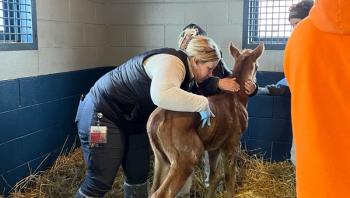
AAHA diagnstic codes standardize disease entry
Long Beach, Calif. - The Diagnostic Codes Task Force established by the American Animal Hospital Association (AAHA) is concluding the development of 2,000 uniformly accepted codes for veterinary practices.
LONG BEACH, CALIF. — The Diagnostic Codes Task Force established by the American Animal Hospital Association (AAHA) is concluding the development of 2,000 uniformly accepted codes for veterinary practices.
"The standardizing of diagnostic codes will mark a major milestone for the veterinary profession," says Dr. Daniel Aja, immediate past AAHA president and chair of the AAHA Diagnostic Codes Task Force. "The project offers far-reaching possibilities for the rapid measurement of compliance in private practices, as well as the facilitation of disease incidence surveillance in companion animals."
The codes are based on human medicine's Systematized Nomenclature of Medicine (SNOMED) system, but are applicable to private companion animal practices.
"Creating a universal set of codes has been attempted many times by other sources, but nothing ever came to fruition. This time we tied diagnosis to common nomenclature," Aja adds.
The process took about a year to match the codes from human to animal medicine — by hand.
"Acquiring the software for the codes will likely not involve a fee for practitioners," Aja adds. "AAHA's goal is to get the codes in use."
By using the codes, the number of animals treated/diagnosed with diabetes, for example, will be able to be monitored at the national level. A monitoring system will be in place to note where certain diseases are more prevalent, as well as compliance levels for clients.
The codes will be expanded gradually; the idea is to have drop menus to describe the cause and nature of each disease more specifically, Aja adds.
Aja envisions a time when use of these codes will aid in pet insurance reimbursement and easier, more thorough record keeping.
AAHA hopes to have the system ready for distribution by the end of the year; beta testing is currently underway, possibly concluding this month.
"Diseases will be added and subtracted throughout time, continually evolving," Aja explains. "The codes will be copyrighted because we want identical lists with all systems, eliminating practices' ability to alter lists themselves."
Specialists/practitioners affiliated with AAHA will be testing the codes' functionality and reporting on any quirks or change recommendations before the codes are released.
"We get calls all of the time from practices that want this," Aja says. "We just want to get the codes in use; we are not interested in making money."
Newsletter
From exam room tips to practice management insights, get trusted veterinary news delivered straight to your inbox—subscribe to dvm360.






